Masks few and far between 3 years after COVID-19 pandemic began
- Oops!Something went wrong.Please try again later.
- Oops!Something went wrong.Please try again later.
They’re everywhere — and they’re nowhere.
Masks are stuffed into purses and coat pockets, glove boxes and book bags.
They occasionally litter a parking lot or sidewalk and pop up unexpectedly amid a load of laundry after lingering in a pants pocket.
Unlike more than three years ago when the COVID-19 pandemic began, masks aren’t on the majority of faces in the country anymore.
Many people — not all — at work, school, the grocery store, the coffee shop, the bus, the airplane and even at public events such as concerts and theatrical performances, have forgone wearing masks. Maybe they’ve been vaccinated or had COVID-19. Maybe both. Maybe none of the above.
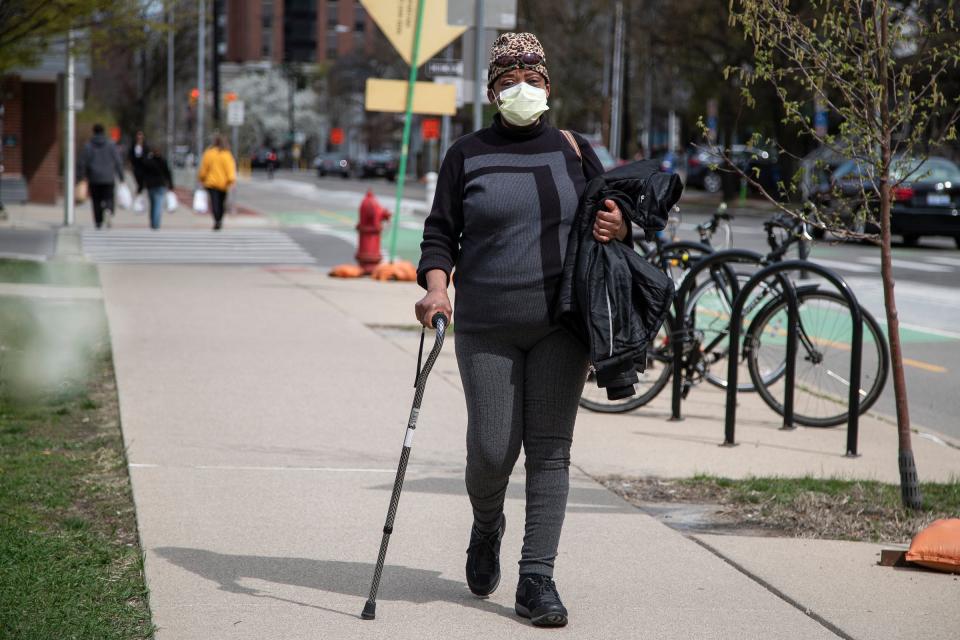
With more tools, masks become less important
Hospitals and doctor’s offices were the last stalwarts requiring masks of employees, patients and visitors. In mid-April, health care systems across Michigan announced they, too, no longer require masks in some settings. Masks will be optional, with exceptions such as in skilled nursing and cancer centers or transplant units.
The once-divisive symbol of what many said was government overreach still serves a purpose, health care experts say, even if they are more optional. The medical community says they help keep people from catching or spreading COVID-19 and other respiratory illnesses.
“We went, over the past three years, from a time point where we had no tools for COVID-19 other than our mitigation measures,” said Dr. Natasha Bagdasarian, Michigan's chief medical executive. “We only had things like masks. We didn't have vaccines. We didn't have therapeutics. And we didn't have rapid tests.
“And we now have a whole host of other tools that we can use in conjunction with masks. And so masks are not the universal recommendation that they once were. Masks have now become something that people can choose to use or not use.”
More: Michigan health care systems ease mask rules
More: 3.17 million Michiganders must reapply for Medicaid. Why it matters now.
Who should still mask up?
COVID-19 is still causing illness and some death, Bagdasarian said, but it’s “nothing like how things were a year ago or two years ago. We’re in a much better place.”
That’s why many people and, most recently, those working in health care, have decided to ease up on wearing masks.
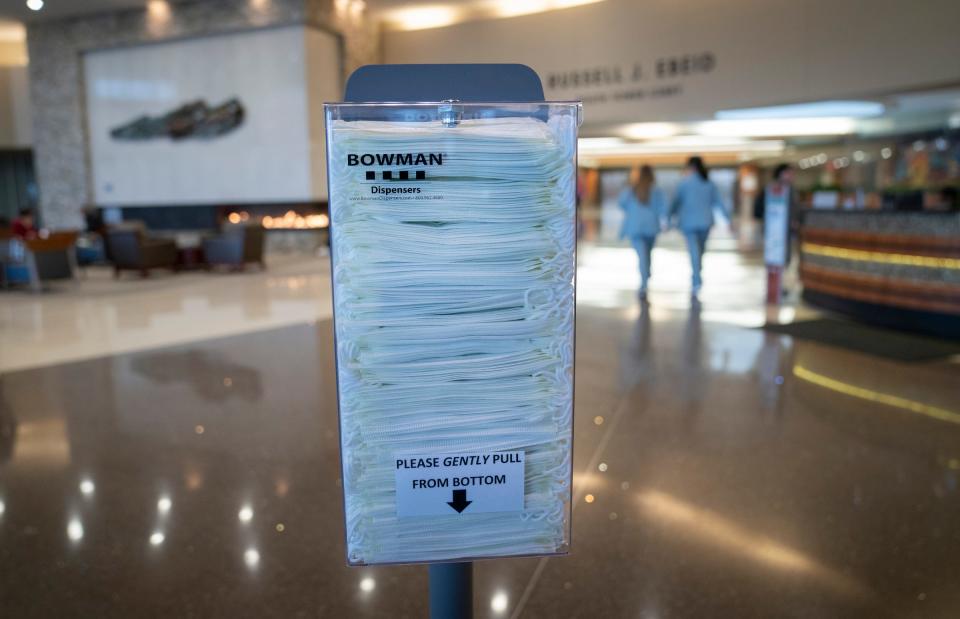
Anyone can wear a mask if they want to or feel they need to. For some, masks are still recommended.
Bagdasarian and other infectious disease experts said those who are not well or who have symptoms of COVID-19 or other respiratory illnesses should mask up. So should those who are caring for someone who is symptomatic or not well.
Bagdasarian said masks may be helpful for those who are at increased risk because they are unable to get a vaccine or aren’t responding to vaccines, those who are immunocompromised or those who have underlying health conditions and are at risk of becoming infected.
They may choose to mask up in public or crowded settings and wear masks that are better fitting and avoid gaps around the face, especially if the mask is for the person’s own protection.
Dr. Matthew Sims, director of infectious diseases research for Corewell Health East, said he has noticed some older people continue to wear masks as they may believe they are more at risk.
He said those who are not vaccinated against COVID-19 “probably should be wearing a mask. If you’ve had it, maybe, you know, you’ve got some protection. But if you’ve never had COVID and you’re not vaccinated, you probably should be masking.”
More: 3 years of COVID-19 in Michigan: The most striking numbers
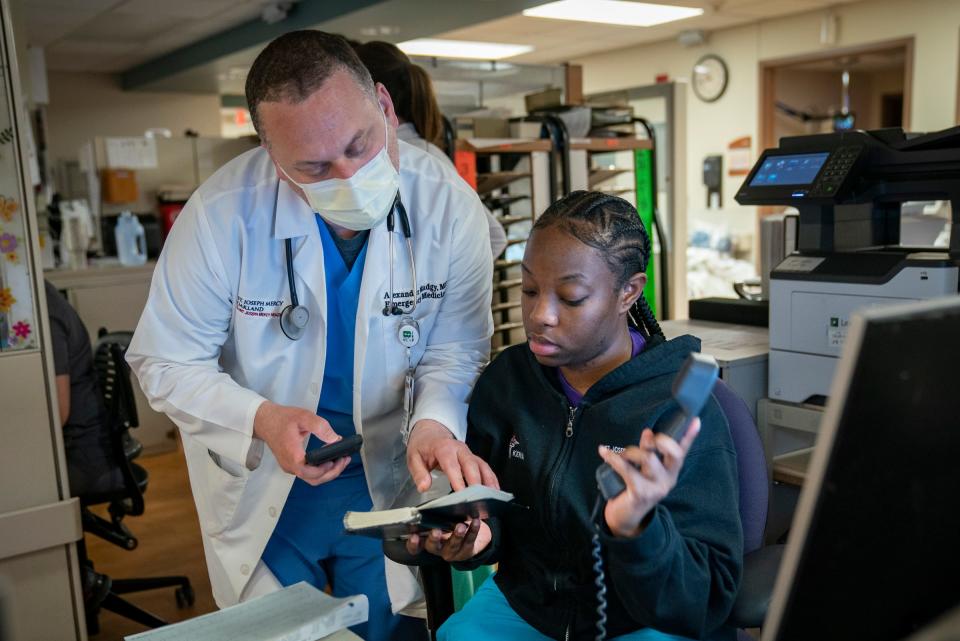
Sims said he still wears masks.
“I haven't had COVID. I don't want to get COVID. I don't want to take the risk of long COVID, so I wear masks. And that’s my choice,” he said.
Sims said while COVID-19 isn’t nearly a serious as it was, “we’re still seeing, the last count I saw, was 250 deaths a day due to COVID in the United States. So that’s not a small number.”
COVID-19 still infecting
Michigan has had more than 3 million confirmed and probable cases of COVID-19 since the beginning of the pandemic and 42,749 deaths, according to state health department data updated Tuesday.
That data showed 428 people — 421 adults and seven children — hospitalized with confirmed COVID-19 cases.
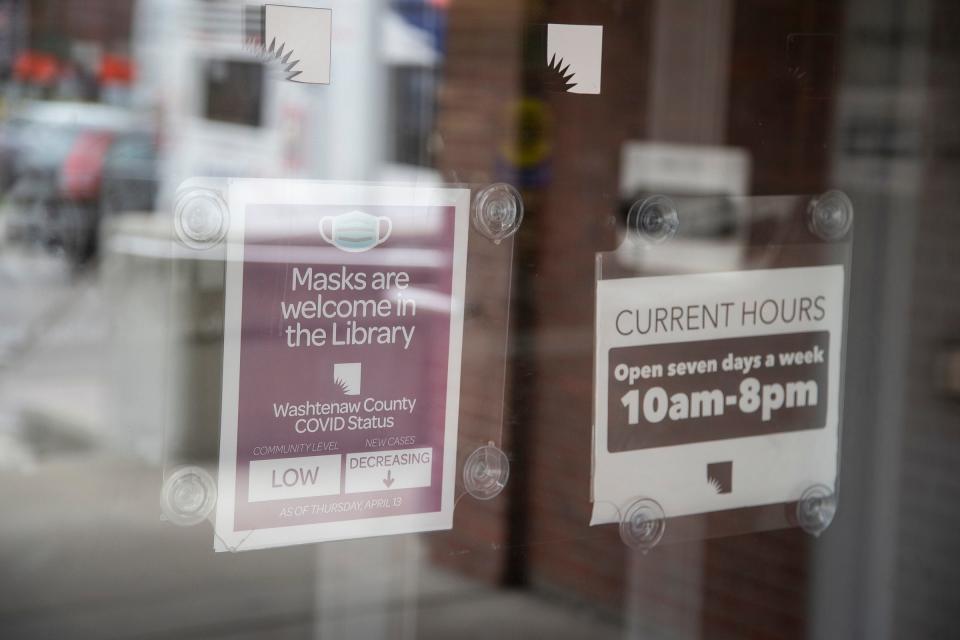
Two weeks ago, when health care systems announced the easing of mask rules in certain areas within their hospitals and other facilities, 504 people were hospitalized with COVID-19, according to state health department data.
All counties in Michigan as of April 20 were at a low COVID-19 community level, based on hospitalizations and cases, according to the U.S. Centers for Disease Control and Prevention.
In the U.S., the federal Public Health Emergency for COVID-19 is set to expire May 11.
More: Michigan surpasses 3 million COVID-19 cases
The World Health Organization declared a public health emergency of international concern in January 2020 and has not declared an end.
Dr. Tedros Adhanom Ghebreyesus, WHO's director-general, said in mid-March: “I’m confident that this year we will be able to say that COVID-19 is over as a public health emergency of international concern. We are not there yet.”
Masks are 'socially acceptable now'
Greg Bowens, of Grosse Pointe Park, the founder and first president of the Grosse Pointes-Harper Woods NACCP branch, said he still has all types of masks tucked in his pockets and his car.
Generally, he doesn’t wear them anymore, but he said he’s not afraid to put one on if he’s in a crowded place or at the doctor’s office.
“I think it’s become engrained in folks if you are not feeling well, wear a mask,” Bowens said. “People don’t look sideways now because you’re wearing a mask. People don’t ask questions about it … It’s socially acceptable now.”
Bowens said the Black community was hit particularly hard by COVID-19 and “that is still with us.”
Early in the pandemic, Black residents in Michigan were becoming infected and dying at a higher rate than white Michiganders.
Gov. Gretchen Whitmer issued an executive order in April 2020 launching the Michigan Coronavirus Racial Disparities Task Force to address the challenge through a variety of efforts, such as expanding testing in communities of color; improving access to health care and COVID-19 treatments and vaccines; and giving out personal protective equipment.
A report released in February indicated the efforts paid off with the mortality rate among Black Michiganders falling in 2021.
More: Lt. Gov: Legacy of racial disparities task force to live on
More: Report: Michigan closed the gap on COVID-19 racial disparities
Mike Johnson wore a blue surgical mask as he walked outside in Mount Clemens, then as he waited inside a bus shelter downtown for a SMART bus.
Johnson, who is Black, said he still wears a mask “just about every time” he’s out, except maybe when he’s walking outside.
“It’s just common sense to me,” he said. “It’s just simple. I really believe (the virus is) gonna come back.”
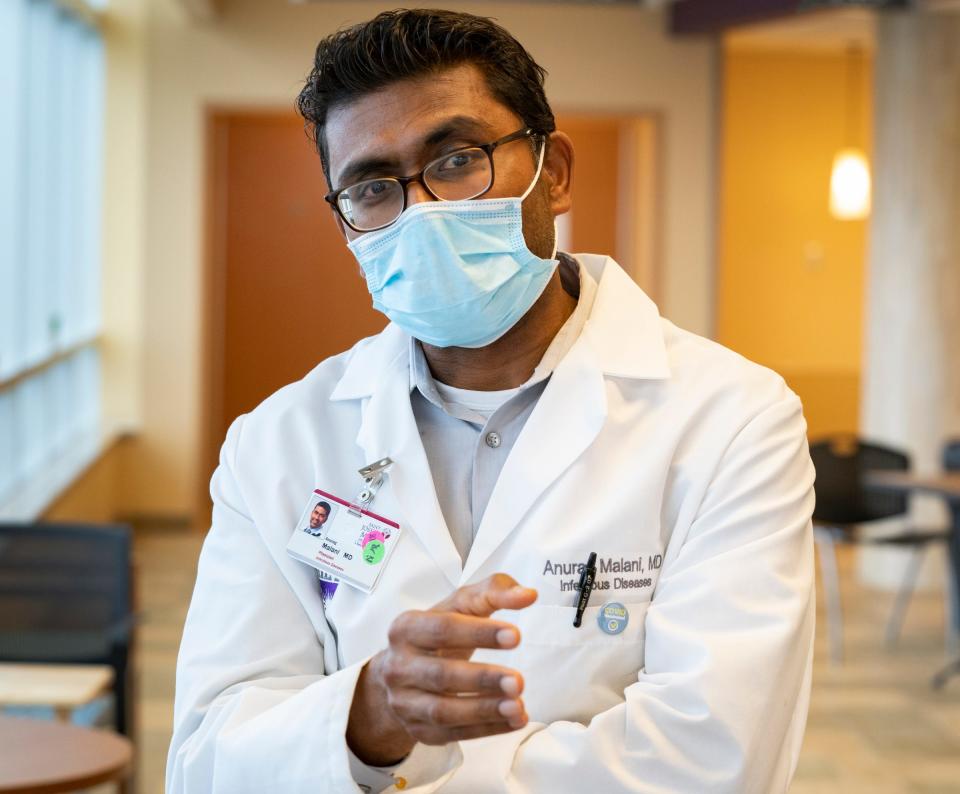
Infectious disease Dr. Anurag Malani, COVID-19 lead for southeast Michigan for Trinity Health, said the virus is endemic. "We’re going to expect to continue to see cases. We wouldn’t expect this to be eradicated or go away.”
He anticipates possibly a single yearly vaccine boost, such as the influenza shot, and expansion of therapeutics. He said he believes, in general, that variants have become less severe. However, that doesn’t eliminate the probability of some bad outcomes.
He said there is immunity in the community and less morbidity and mortality than three years ago.
“Hopefully, we don't go back to a time where we were 2020,” Malani said, adding that he believes that is “unlikely, based on everything else that we see.”
Smiling faces, better communication
Chad and Ryanne Kelley wore masks for pretty much all Ryanne’s obstetric appointments before their daughter, Layne, was born April 20 at Trinity Health Oakland Hospital in Pontiac.
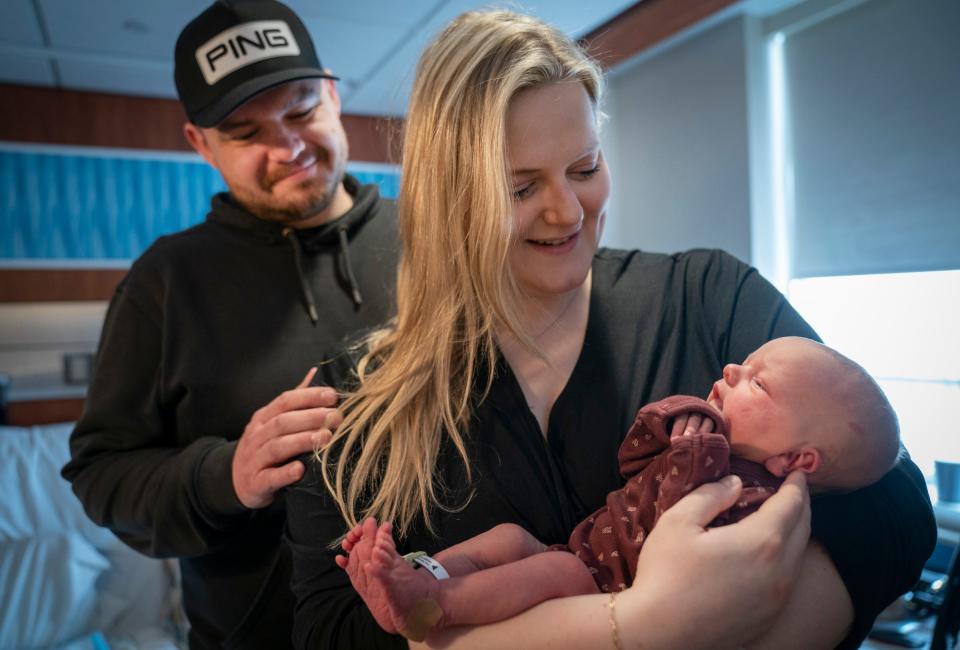
It was a relief to the new parents that they didn’t have to wear a mask in the hospital as the health system eased its masking rules just three days earlier. That was especially true for Ryanne, an art teacher at Springfield Plains Elementary School in Clarkston, who “had to be in labor all day long and we were here for like 24 hours before delivery. It made a huge difference not having to mask.”
“It was nice to see the nurse’s faces,” she said as she worked to button a onesie on their newborn.
“It was,” Chad agreed.
“It’s really, really just more personal,” Ryanne said.
“It’s strange not seeing a doctor and a nurse having a mask on. It just puts kind of a barrier there, like it doesn’t feel as, like, authentic, I guess,” Chad said.
However, Ryanne said she “doesn’t think twice” if someone is or isn’t wearing a mask, in general, and they don’t mind wearing them. She said they have family members who are autoimmune and have chronic illnesses.
“The judgment isn’t there,” she said of mask-wearing today.
Dr. Shawn Sloan, an emergency department doctor at Trinity Health Oakland Hospital, said that he hasn’t given up wearing masks and that he and his wife, a physical medicine and rehabilitation doctor at Corewell Health William Beaumont University Hospital in Royal Oak, still wear them on airplanes.
“We’ve seen enough sicknesses, there’s no sense in bringing it home,” he said Friday, adding that his wife also was pregnant with their first baby, due that day.
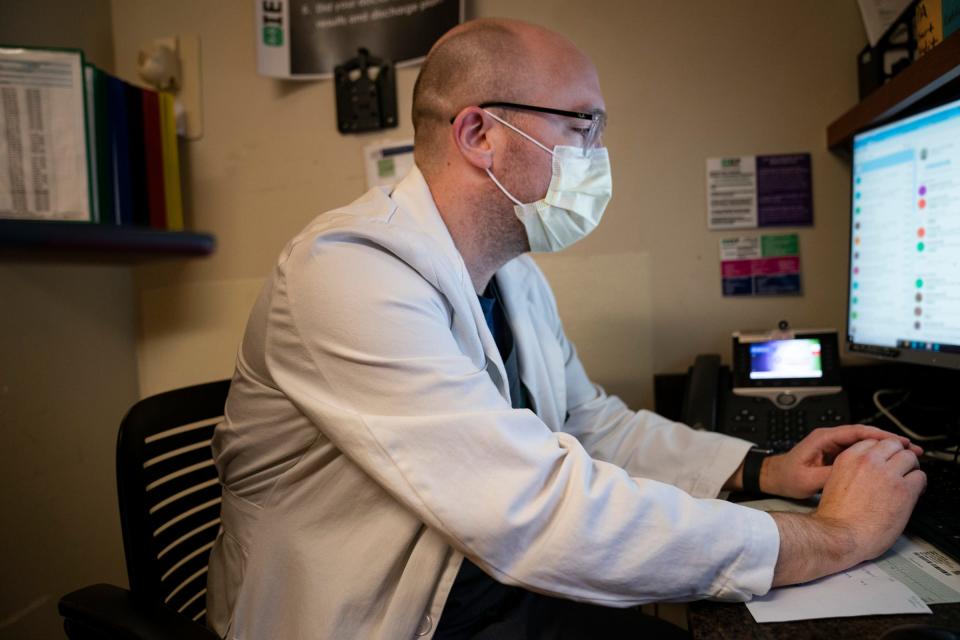
Sloan, who was donning a blue surgical mask while working in an office in the ER, said he has noticed mixing and matching on mask-wearing on airplanes, with some people wearing surgical masks and others wearing an N95. Some fliers wear no masks.
“It’s kind of just whatever your comfort level is. But you know, when you're in a tight, enclosed space like that, I don't know. At least me, and my opinion is, here when we're in the emergency department and we're seeing sick patients every day, there’s no sense in taking something room to room. I'm probably gonna stick with masks for the foreseeable future,” he said.
More: Opinion: Michigan used federal COVID-19 funds in cities across Michigan. Here's how.
Sloan said it’s tough to remember a time when he and his colleagues didn’t wear masks. He anticipates some “waxing and waning” of the mask-optional policy, but he hopes this means we're “getting out of the pandemic.”
Becky Landry, a registered nurse in the mother-baby unit at Trinity Health Oakland, worked her first hospital shift without a mask Friday.
“I keep feeling like I’m forgetting something,” she said with a smile.
Landry said she still wears a mask outside of work for her son’s piano lessons as the teacher’s husband is compromised.

At work, she said, communication with patients has improved without masks. Patients can hear the nurses better and better understand discharge paperwork.
More: 'Multi-facility outbreak' of deadly, drug-resistant fungus wallops Michigan hospitals
As 'important as masks are, they are kind of distracting, too'
Nicole Davis, a registered nurse in the hospital’s emergency department, agreed, saying elderly patients or those who have difficulty hearing now can read the lips of the doctors, nurses and others caring for them and better understand what they are saying without masks.
Emergency department Dr. Jason Gumma said from a doctor’s standpoint, the ER is the first time they meet many patients.
“So, we have like two minutes for us to really develop trust and for them to open up with their personal information,” he said, adding that as “important as masks are, they are kind of distracting, too.”
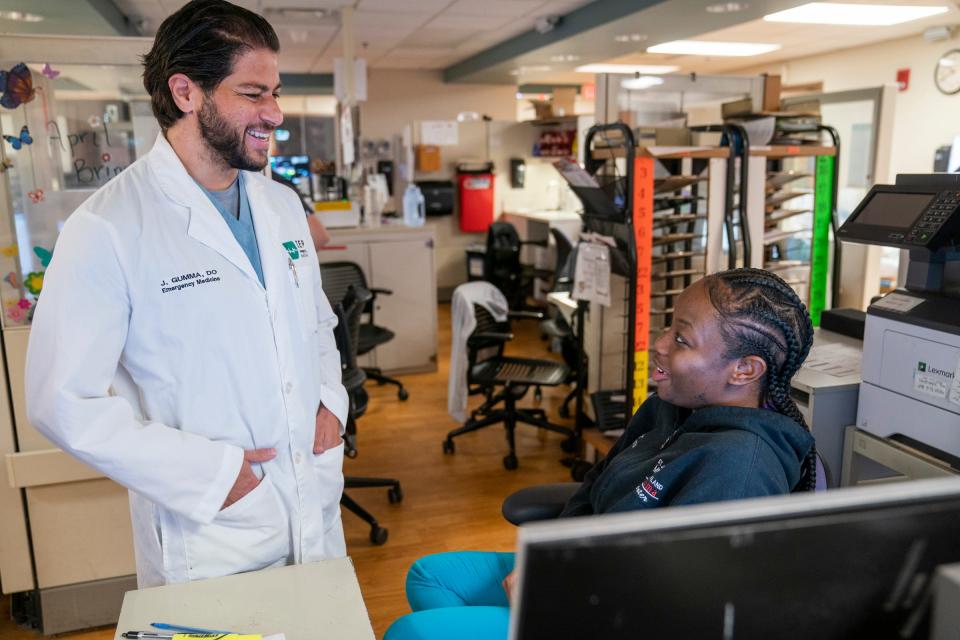
Davis and Gumma said a patient not wearing a mask also helps with their physical assessment, such as whether the patient’s lips are blue or dry. Facial gestures are easier to recognize.
They and others working in the ER said mask wearers are about 50-50, or the number of mask wearers you’d see in the grocery store today. Gumma said he’s noticed that visitors will mask up more than patients.
“Everyone’s more educated. The perception of (masks) has eased a lot. You either wear it or you don’t. There’s no judgment. The bad stigma has gone away,” Davis said.
She and other colleagues said they are happy masks are optional for other reasons, too, such as seeing their co-workers' smiling faces again.
Dr. Howard Markel, director of the Center for the History of Medicine at the University of Michigan, said he’ll still be wearing a mask if he goes to his doctor. He said he avoided COVID-19 for three years, but became sick with the virus in January.
“We’re only as good as our protections,” he said. “We’ve not conquered germs. At best, we’ve wrestled them to a draw.”
Contact Christina Hall: chall@freepress.com Follow her on Twitter: @challreporter.
Support local journalism. Subscribe to the Free Press.
This article originally appeared on Detroit Free Press: Masks not required in most places: Planes, hospitals still have risks

